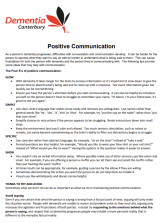If you're a frequent visitor to Healthify, why not share our site with a friend? Don't forget you can also browse Healthify without using your phone data.
Dementia – behaviour changes
Information for carers of people with dementia about managing behaviour changes
Key points about dementia and disruptive behaviour
- It's common for people with dementia to have changes in their behaviour.
- Dementia often makes it difficult for the person to do what they need for themselves, and to communicate what they need with carers.
- Sometimes being confused leads to behaviour which is difficult to understand.
- Sudden changes in behaviour can be caused by tiredness, hunger, medicines or another illness.
- These changes make life tough for both the person and their carers.
- Management of behaviour changes usually involves non-medicine behavioural strategies.
- There are things you can do as a carer to help cope with upsetting behaviour.

People with dementia behave differently than they used to. In the early stages they may try to hide their memory difficulties. They may seem defensive or suggest a story to explain a memory gap. As time goes by, behaviour changes can be disruptive and more distressing than the loss of memory for both the person with dementia and whānau or carers looking after them.
Some examples of behaviour changes in dementia include:
- restlessness, confusion and agitation
- aggression
- walking around (wandering)
- sleep disturbance and night-time waking
- repeating behaviour such as asking the same question or doing the same thing over and over again
- shouting, crying out
- shadowing – following their partner or carer constantly
- hoarding – keeping things that don’t seem needed, or carrying unusual things around
- eating, dressing or going to the toilet in ways they wouldn’t usually
- sexually inappropriate behaviour
- apathy (lack of motivation).
These behaviours can get worse in the late afternoon when daylight fades, which is also known as sundowning.
Dementia can cause:
- Anxiety
- Depression
- Hallucinations – seeing or hearing thing which aren’t there
- Delusions – believing things which aren’t real, such as that their partner is being unfaithful or that people are persecuting them.
Changes can be caused by:
- The dementia itself:
- brain cells not functioning as well as they used to
- difficulty managing emotions
- the sleep/wake cycle (body clock) not working well
- recent memories no longer being available so older memories seeming to be happening now
- forgetting how to do things or how to behave in certain situations.
- Communication problems – not being able to find the right word, other people moving on too fast, not being able to see or hear well.
- The environment – unfamiliar or cluttered spaces, noise or lighting, feeling overwhelming.
- Physical needs not being met – being hungry, thirsty, hot or cold, constipated or in pain.
- Emotional needs not being met – feeling lonely, isolated, scared, powerless, bored, or no longer feeling useful or important.
- Medicines – such as painkillers or sleeping tablets.
- Illness – such as urine or chest infections.
For some people, behaviour change can be caused by medicines or a health condition. Bring the person you’re caring for to your healthcare provider to for a check-up. They may be able to diagnose pain or illness, issues with hearing or vision, physical discomfort such as constipation or dehydration, or psychological conditions.
Your healthcare provider can assess and rule out any underlying problems and give advice on managing behaviour changes.
If behaviour changes are caused by a health problem or medicines, treating the health problem and reviewing medicines can help. Your healthcare provider can help check and rule out any underlying problems.
If no underlying problems are found treatment can include:
- keeping a diary to help identify when behaviour changes cause problems and any triggers
- making a plan to prevent the behaviour when possible, or to manage it skilfully when it happens
- medicines such as antidepressants or antipsychotics.
Geriatricians are specialists involved in the long-term care of people with dementia. If behaviour becomes a more serious problem, psychogeriatricians (psychiatrists who specialise in mental health for older adults) may also help in their care.
Most people with dementia are able to stay at home. Sometimes behaviour changes can leave people unsafe, for example people who walk on busy roads at night. If a person with dementia, or the people around them, are unsafe your healthcare provider will discuss moving to live in residential aged care.
Everybody has basic needs. Our behaviour is a way of communicating our needs. A person with dementia may no longer be able to meet their own needs as their language, problem solving and thinking abilities get less over time. Although it's not easy to cope with behaviour changes in people with dementia, there are things you can do to make life calmer for both of you.

Image credit: Freepik
Have a daily routine
Establish a basic daily routine in the household and try to stick to it. Keep the schedule in a place where everyone can see it.
Try to keep things as normal as possible. Support the person with dementia to be as independent as possible. Encourage them to do tasks or parts of tasks they are able to do. This helps them keep a sense of dignity and usefulness.
People with dementia may get more confused and agitated later in the afternoon. Plan to do activities that use more energy, such as showering, earlier in the day. Try having the biggest meal at midday.
In the evening, set a quiet mood with lower lights, less noise and soothing music. Try to keep the bedroom dark and comfortable to encourage sleeping.
Exercise
You can help the person do simple exercises such as taking 1 or 2 walks each day. Physical activity helps reduce anxiety, improves mood, and increases the chances of sleeping better at night.
Create a calming environment
- Keep sound levels low, eg, TV volume – this may mean getting a hearing aid if needed.
- Keep the room lighting and temperature just right.
- Use labels for objects they use often.
- Provide easy access to the toilet, and a label for the door (this can be a picture).
- Don't have too many visitors at once.
- Keep drinks and snacks in a place where they can easily be seen,
Don't argue
Don't argue or raise your voice when the person you're caring for is distressed or agitated. Instead, try to explain things to them in a calm and reassuring voice. If an explanation doesn't help, you can try to focus on music, singing, dancing, going for a walk or asking them to help with a simple task such as folding clothes or setting the table.
How you say things can make a big difference, read more about positive communication(external link).
Offer general reassurance
People with dementia can feel insecure and unsafe at times if they can't remember things or are confused in their environment. They may follow and shadow their carers around wherever they go. They may need frequent reassurance that they’re safe and not alone. As a carer, you can tell them ”you’re safe” without needing to repeat exactly where and when they are. Let them stay with you if you're doing household chores.
Plan simple activities and social time
Plan activities that the person you are caring for enjoys:
- cards, games and puzzles
- art including colouring
- craft and making things
- going to a sports game or watching sport on TV
- music and dance
- caring for animals.
Keeping an active social life can help meet their needs. Try to keep up any regular church, RSA or club meetings or get togethers, with help if needed. People like to be given a practical way to help you.
Attending day programmes in facilities can provide motivation and socialisation for people with dementia while providing a break (respite) for you as their carer. It may be difficult to introduce the idea of going to a day programme to a person with dementia as they may not see the need to go and may prefer to stay at home. It can take time for a person with dementia to get used to a new environment and new people.
Ask other people, such as your healthcare provider, family and friends to provide encouragement and to reinforce the positive benefits. Begin by trying a day programme one day a week and increase this as the person gains confidence to attend.
Ask about suitable day programmes by contacting your Needs Assessment and Service Coordination (NASC)(external link) team or local Alzheimer’s New Zealand(external link) branch.
Think about who this person is
Thinking about who they are can help you work out what they need, even when they can’t tell or show you. You might like to think about:
- where they grew up
- whether they come from a big whānau
- whether they like lots of company or lots of quiet time
- interests
- spiritual beliefs
- whether they come from a different culture from the one they live in now
- jobs they’ve had
- big life events.
Take care of yourself
You can’t care for another person for long if your own needs aren’t being met. Make sure you are taking time to eat, sleep and exercise. Accept practical help from family, friends and workmates – it’s good for the person with dementia too. Share your experience with other carers. Read more about caring for yourself.
Apps reviewed by Healthify
You may find it useful to look at some dementia apps and carer support apps.
- Get yourself safe (even if this means going into a different room)
- Keep your person with dementia safe (even if this means locking a door, turning off the electricity or calling 111).
What need is your person living with dementia trying to get met?
Do they need:
- water or food
- to go to the toilet
- to be warmer or cooler, eg, more or fewer clothes on
- less noise, light or people
- sleep
- activity or a change of scene
- reassurance, love, to talk about something that is important to them or to a special person on the phone
- time with a pet or music they enjoy.
Changed behaviour in dementia can create a lot of stress and be distressing for family/whānau or carers. As a carer, it’s important to make sure you look after your own health and wellbeing. Learn more about the support for carers of those with dementia.
There's a wide range of support organisations and services that are there to help you if you’re caring for someone with dementia.
- Alzheimers New Zealand(external link) Phone support 0800 004 001
- Dementia New Zealand(external link) Freephone 0800 433 636
- New Zealand Dementia Foundation(external link)
- Carers New Zealand(external link) 0800 777 797
- Eldernet(external link) Information service on issues affecting older New Zealanders
- Seniorline(external link) Information about how to get help at home, community services and rest homes.
The following links provide further information about behaviour changes in dementia. Be aware that websites from other countries may have information that differs from New Zealand recommendations.
Understanding changed behaviour – a guide for people with dementia and their family/whānau(external link) Alzheimer's New Zealand
Dementia – behaviour changes(external link) Better Health Channel, Australia
Mood and behaviour changes(external link) Dementia Australia
Coping with dementia behaviour changes(external link) NHS, UK
Resources
A guide for carers(external link) Ministry of Social Development, NZ, 2021
Understanding changed behaviour(external link) Alzheimers New Zealand, 2021
Positive communication(external link) Dementia New Zealand, 2022
Disinhibited behaviour(external link) Dementia New Zealand
Dementia and behaviours(external link) Dementia Canterbury, NZ, 2023
Apps
Dementia apps
Carer support apps
References
- Managing the behavioural and psychological symptoms of dementia(external link) BPAC, NZ, 2020
- Dementia friendly communities(external link) Alzheimers New Zealand
- Behavioural and psychological symptoms of dementia (BPSD)(external link) Auckland Regional HealthPathways, NZ, 2020
- Understanding changed behaviour – a guide for people with dementia and their family/whānau(external link) Alzheimer's New Zealand, 2016
See our page dementia for healthcare providers.
Brochures
Credits: Healthify editorial team. Healthify is brought to you by Health Navigator Charitable Trust.
Reviewed by: Dr Emma Dunning, Clinical Editor and Advisor
Last reviewed:








